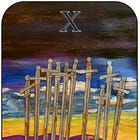Masks and Armor
Gloved and masked in mycelium tech, we went about in our competent way, rounding up the city waste for free. Metal Dogs - Chapter 4
My sponsor met me at the door with a carton of disinfectant wipes for my hands. Then she gave me a lightweight, clear plastic, strappy gizmo with a cylindrical center full of what looked like dirt.
It wasn’t the death threats that brought me to SIA (as a guy in my AA meeting said, “so it’s your fifteen minutes of fame.”) It was the quiet after all the drama. It was the grim. The sepia days. The question as I drove around town—This is so hard; why do it?
One day, between the lonesome of Thanksgiving and the lonely of Christmas, I had stomped the snow off my boots and entered the fogged glass doors at the Gargoyle Church. There they were: my people.
For us, life had become unmanageable. Suicide seemed like an option. Homicide seemed viable. Some had done time in prison. Most of us lost sleep and peace fantasizing about revenge.
I quickly became dependent on the community in the rooms. I looked up to the elders there: to Juno, to Dido, to Britomart and Manel. My brother Andy, leaned back and grinned when I came in, tucked his bottom lip up. Camilla, as always inseparable from Gallia, stood and took me into her rough arms, then sat me beside her from day one, elbowing me gently and winking at me as the room laughed. I remembered this from AA—stories that would have shocked outsiders. We laughed because we were no longer alone.
The other newcomers, Cly, and Xan met my eyes from within their own raw armor, a glint of hope cutting through above the shadows.
Then, the elders took us to coffee.
There were many more beautiful folks in the daily meetings. But these were mine.
I was home.
It was weird, but I kept returning to the dingy room and the cracked cushions on the seats. I drank the bad coffee, with the dried creamer, from the chipped cups.
That March, the pandemic hit and we were told to shelter in place, alone in our homes. I was pretty scared. I had seen the Italians singing to each other on their balconies. I had heard their warnings, their remorse. I went dutifully indoors. I checked the news. I shook my head in amazement at the toilet paper shortage. I waited for my government to set up testing and to provide guidance.
My AA and ACA went on Zoom, but when I called my SIA sponsor, she said, “Come on down to the meeting.”
Stephen was there planting flowers when I got there. He smiled his gappy grin. He laughed his hoarse laugh. He had a hard time staying sober. But we had been friends in the rooms for years.
I knew not to hug him. I can still remember the last hug I had had: on March 11th at an AA meeting. Les. Before nightfall, I was already afraid one of us would get the other sick.
My sponsor met me at the door with a carton of disinfectant wipes for my hands. Then she gave me a lightweight, clear plastic, strappy gizmo with a cylindrical center full of what looked like dirt.
“Put this on.” It was a mask. “Keep it watered. Report in here tomorrow at 6 a.m. for service work.”
And that is how I learned how the SIA meetings and the quiet garbage collectors were related. The very next day, I was assigned a shift in my neighborhood.
Gloved and masked in mycelium tech, we went about in our competent way, rounding up the city waste for free.
NEXT CHAPTER
Mycelium Tech
In 2014, my biologist brother, Andy, sent me a speech by mushroom specialist Paul Stamets. Initially, I doubted. But by the end of the speech I was in tears of relief. Stamets showed us how fungus had cleaned up a diesel spill, as well as a chemical waste, restored ecosystems, and performed pest control. We were not alone, nor were we dependent on human…









